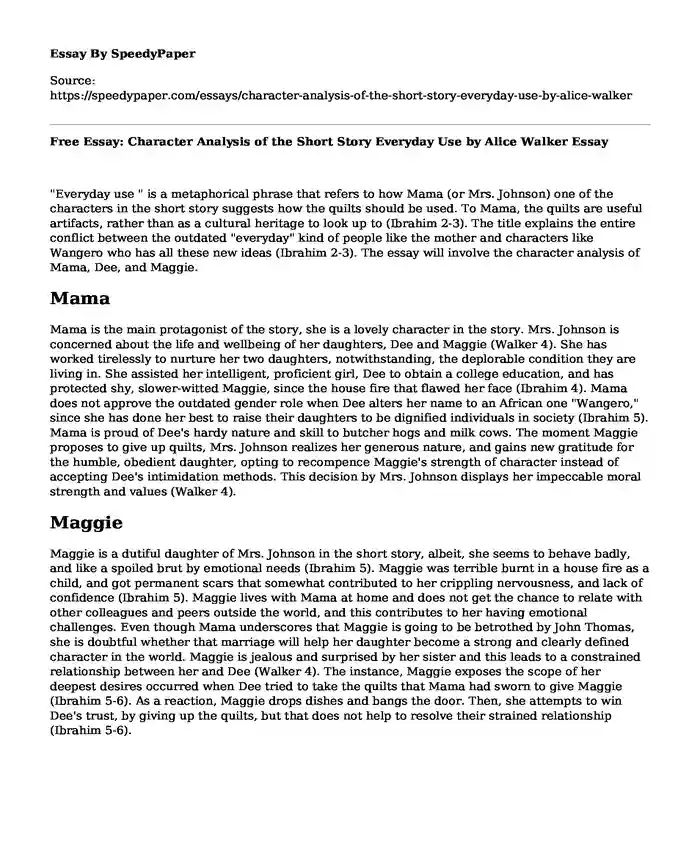
| Type of paper: | Essay |
| Categories: | Alice Walker Character analysis Books |
| Pages: | 3 |
| Wordcount: | 757 words |
"Everyday use " is a metaphorical phrase that refers to how Mama (or Mrs. Johnson) one of the characters in the short story suggests how the quilts should be used. To Mama, the quilts are useful artifacts, rather than as a cultural heritage to look up to (Ibrahim 2-3). The title explains the entire conflict between the outdated "everyday" kind of people like the mother and characters like Wangero who has all these new ideas (Ibrahim 2-3). The essay will involve the character analysis of Mama, Dee, and Maggie.
Mama
Mama is the main protagonist of the story, she is a lovely character in the story. Mrs. Johnson is concerned about the life and wellbeing of her daughters, Dee and Maggie (Walker 4). She has worked tirelessly to nurture her two daughters, notwithstanding, the deplorable condition they are living in. She assisted her intelligent, proficient girl, Dee to obtain a college education, and has protected shy, slower-witted Maggie, since the house fire that flawed her face (Ibrahim 4). Mama does not approve the outdated gender role when Dee alters her name to an African one "Wangero," since she has done her best to raise their daughters to be dignified individuals in society (Ibrahim 5). Mama is proud of Dee's hardy nature and skill to butcher hogs and milk cows. The moment Maggie proposes to give up quilts, Mrs. Johnson realizes her generous nature, and gains new gratitude for the humble, obedient daughter, opting to recompence Maggie's strength of character instead of accepting Dee's intimidation methods. This decision by Mrs. Johnson displays her impeccable moral strength and values (Walker 4).
Maggie
Maggie is a dutiful daughter of Mrs. Johnson in the short story, albeit, she seems to behave badly, and like a spoiled brut by emotional needs (Ibrahim 5). Maggie was terrible burnt in a house fire as a child, and got permanent scars that somewhat contributed to her crippling nervousness, and lack of confidence (Ibrahim 5). Maggie lives with Mama at home and does not get the chance to relate with other colleagues and peers outside the world, and this contributes to her having emotional challenges. Even though Mama underscores that Maggie is going to be betrothed by John Thomas, she is doubtful whether that marriage will help her daughter become a strong and clearly defined character in the world. Maggie is jealous and surprised by her sister and this leads to a constrained relationship between her and Dee (Walker 4). The instance, Maggie exposes the scope of her deepest desires occurred when Dee tried to take the quilts that Mama had sworn to give Maggie (Ibrahim 5-6). As a reaction, Maggie drops dishes and bangs the door. Then, she attempts to win Dee's trust, by giving up the quilts, but that does not help to resolve their strained relationship (Ibrahim 5-6).
Dee
Unlike Maggie who suffers from wariness and lack of education due to the scars she had sustained from the house fire incident, Maggie is a bright daughter of Mama. She displays a figure of wariness, and dignity in the family. She develops a strong personality and a sense of belonging. Through, her strong ambition, and gumption, Dee becomes a contemporary, learned lady despite coming from a humble family (Ibrahim 6-7).
She attempts to rename herself "Wangero", a sign of pride in her distant African culture, and one that disintegrates her from the oppressions her forefathers faced in South America (Walker 4-5). Dee is fascinated by their rural pragmatism, snapping pictures as though they are themes of a documentary, and in doing so effectively distances herself off from her family. Rather than honoring, and accepting her background, Dee looks down on her environment, seeing herself to be above Maggie, and her mother (Ibrahim 6-7).
In conclusion, "Everyday Use" is a short story that depicts the problem of acceptance to the audience. Acceptance is a broad subject experienced in everyday life, and in different social contexts (Ibrahim 6-7). While doing the character analysis, one that has come out clearly is that Maggie suffers from shyness, which results from her ability not to accept that she was disfigured during the house fire incident and that life has to continue. Finally, from the character analysis, two themes have stood out; the theme of family, and heritage or culture.
Works Cited
Ibrahim, Rawezh. "Analyzing Everyday Use by Alice Walker." (2020). 1-7. Retrieved from https://www.academia.edu/10016962/Analyzing_Everyday_Use_by_Alice_Walker
Walker, Alice. Everyday use. Recording for the Blind & Dyslexic, 2004. 1-16. Retrieved from http://electricacademia.pbworks.com/w/file/fetch/88138283/Everyday%20Use%20-%20eNotes%20G
Cite this page
Free Essay: Character Analysis of the Short Story Everyday Use by Alice Walker. (2023, Apr 10). Retrieved from https://speedypaper.com/essays/character-analysis-of-the-short-story-everyday-use-by-alice-walker
Request Removal
If you are the original author of this essay and no longer wish to have it published on the SpeedyPaper website, please click below to request its removal:
- Writing Assignments Essay Samples
- Free Essay on Analysis of British Petroleum: Mission and Vision Statement
- Research Paper Sample on Catheter-Associated UTIs
- The Class Conflict - Free Essay in Modern History: 1750-Present
- Free Essay about Pain: Balance Between Analgesia and Side Effect
- The Impact of Writing Multiple Drafts on my Writing
- Free Essay: Information Security Continuous Monitoring-Challenges and Solutions
Popular categories




